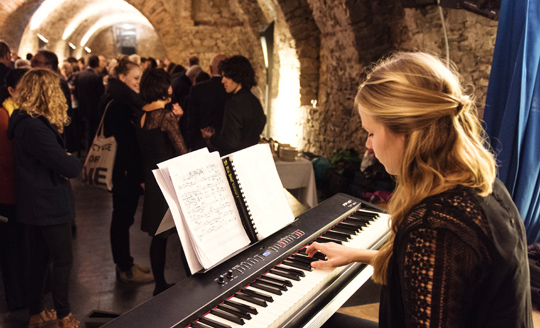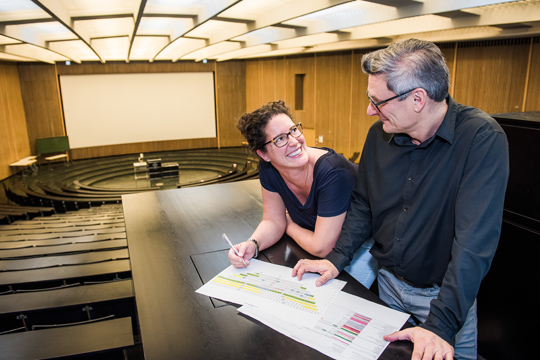Advanced course in party throwing
Freiburg, Aug 13, 2018
Give thought to the guests’ safety, find the right location, organize the catering, check the equipment - and beat the advertising drum: Planning an event can be a lot of work. Melanie Hübner and Gregor Kroschel are responsible for event management at the University of Freiburg. They spoke with Kerstin Ernst about the essentials of planning an event - and why it doesn’t always have to run like clockwork.

The food, the sound and the lighting are right - a casual reception in the Peterhofkeller at the start of the academic year. Photo: Patrick Seeger
Ms. Hübner, Mr. Kroschel, what do you have to watch out for when planning an event?
Hübner: Fire safety and general safety! These are two very important areas at the moment in which the state has strict rules and enforces them. When you hold an event you have to ensure that the guests will be safe. Prior to the event, I have to ask myself: Where with it take place and how big does the room have to be for the number of people attending? Will we need to regulate how many are let in? Who is responsible for things left in the cloakroom, and are the emergency exist easily accessible?
Kroschel: You also have to have a clear idea in advance of what goals the event has and who it is aimed at. That includes thinking about what the guests will expect. And after the event, it is important to evaluate it all and to ask whether you achieved your aims. You can learn a lot from that for your work in the future.
How much time should you earmark for organisation and planning?
Kroschel: That depends on the nature of the event and the number of attendees. If I want sponsoring for an event, I need to start seeking sponsors one to two years ahead. The concept and the idea have to be ready when I take it to the sponsors. The fine details can follow later. The good thing is that with regular events, you often have a plan ready - and the overall process is quicker.

Start early and keep an eye on everything - Melanie Hübner and Gregor Kroschel plan central events at the University of Freiburg. Photo: Klaus Polkowski
Hübner: We usually plan events at which the Rector will make an appearance. His calendar is full and we have to set our desired dates at least nine months in advance. And then there are events which are always on the calendar: As soon as one first-semester event is over, my planning for the next begins. It takes place at the SC stadium and I have to tell the club when the next date will be. The SC has to fit in with the German First Division Soccer League timetable.
What are the highlights of your work? You must have had a few funny experiences.
Kroschel: The people you meet in this job play a big role. I found one experience at the Science Fair particularly funny. All the tents had been put up, when a city official came past after his working hours. He pointed to one tent and said: “I didn’t approve this one.” We were skeptical but had to investigate - without a fuss being made. It turned out that the man was no longer even responsible for the Science Fair and the information was out of date.
Hübner: I agree - it’s the people you meet who make it worthwhile. We like the guests we call the snack chasers. Visitors who only come to fill their pockets with sandwiches. A funny thing happened to me at the Summer Ball at the Freiburg concert house. All of a sudden one of the security people came to me and said “Ms. Hübner, there is a man with a gong.” We didn’t want to risk this man making a big noise with his gong, so we searched the whole building but found no-one. Later we found out that the security people were having a joke on us.

A major event at the SC Stadium Freiburg - the First-Semester Day is barely over, but the planning for the next one has already begun. Photo: Patrick Seeger
Are there events at which everything runs smoothly?
Hübner: No, and I even think it would be dull if everything always went as planned. We would miss the adrenalin. I always say “The main thing is that the guests are not disturbed.”
Kroschel: That’s right; looking from the outside everything usually works and that is the main thing. When the event goes the way it was planned, the public don’t notice slip-ups – except when there’s no sound, which happened this year at the Dies Universitatis. In cases like that you have to be able to improvise. The guest speaker took it calmly; she simply spoke in a louder voice.
Tips and tricks
Planning aids, checklists and an overview with contact offices: Melanie Hübner and Gregor Kroschel provide an information pack for anyone planning a university event.
More information

